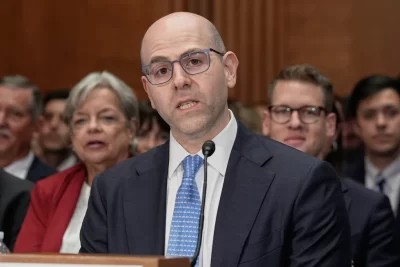
House Speaker Kevin McCarthy emerged with a spending cut plan to avert a looming federal government shutdown by appeasing his hard-right flank, only to see it quickly collapse Thursday in a crushing defeat, the next steps uncertain.
His latest attempt to move ahead with a traditionally popular defense funding bill as a first step toward keeping the government running was shattered by a core group of Republican colleagues who refused to vote with the increasingly endangered speaker.
A test vote to advance the bill failed, 212-216, as a handful of Republicans joined with Democrats to stop it. It was the third time that McCarthy, R-Calif., has been stymied, and once again the House came to a sudden standstill.
The open revolt was further evidence that McCarthy’s strategy of repeatedly giving in to the conservatives is seemingly only emboldening them. A handful of GOP lawmakers, urged on by Donald Trump, the party’s early front-runner for the 2024 presidential nomination, has run roughshod over their own House majority.
Trump urged the conservatives to hold the line against the higher funding levels McCarthy had agreed to with President Joe Biden earlier this year and to end the federal criminal indictments against him.
A federal shutdown looms Sept. 30, the end of the current budget year, if Congress cannot pass the bills needed to fund the government or approve a short-term measure to keep Washington running while negotiations continue.
“We need the extreme MAGA Republicans to get their act together,” said House Democratic leader Hakeem Jeffries of New York, referring to Trump’s campaign slogan.
“End the civil war,” Jeffries urged the Republicans. “Get your act together.”
The White House and Democrats, along with some Republicans, warn that a shutdown would be devastating for people who rely on their government for everyday services and would undermine America’s standing in the world.
Moving forward with the defense bill was supposed to be a way for McCarthy to build goodwill among the GOP House majority as he tries to pass a more temporary bill just to keep the government open.
Many on the right flank want to see progress on the 12 individual appropriations bills that would fund the various federal departments at the lower levels these lawmakers are demanding before they give their votes for any stopgap measure.
But the test vote on the defense bill shattered McCarthy’s strategy.
He commands a narrow majority in the House, and Republicans appeared on track, in a tight roll call, to advancing the measure Thursday. Then the Democrats who had not yet voted began rushing into the chamber.
New York Rep. Alexandria Ocasio-Cortez and fellow Democrats yelled out to hold open the vote. She was a “no.” A few others came in behind her and tipped the tally toward defeat.
The Democrats oppose the military bill on many fronts, including the Republican provisions that would gut diversity programs at the Pentagon.
As passage appeared doomed, attention turned to the Republican holdouts to switch their votes.
GOP leaders spent more than an hour on the floor trying to recruit one holdout, Rep. Dan Bishop. R-N.C., to vote “yes.”
Bishop told reporters afterward that he would have been willing to flip his vote in support but that he felt that previous evening’s long meeting, when McCarthy convened lawmakers for two hours in the Capitol basement, did not provide him the assurances he needed.
“Every time there’s the slightest relief of the pressure, the movement goes away from completing the work,” Bishop said.
When asked what it would take to gain his vote, Bishop said, “I think a schedule of appropriations bills over Kevin McCarthy signature would be meaningful to you to me.”
Others were dug in, too.
Rep. Marjorie Taylor Greene, R-Ga., a chief opponent of more aid for Ukraine in the war against Russia, said she voted against the defense bill because her party’s leadership refused to separate out the war money. Her stand came as Ukraine’s president, Volodymyr Zelenskyy, was at the Capitol during a high-profile visit to Washington.
McCarthy had pledged to keep lawmakers in session this weekend for as long as it took to finish their work. But as he runs out of options, the next steps are uncertain.
Many Republicans were starting to speak up more forcefully against their hard-right colleagues.
New York Rep. Mike Lawler, who represents a swing district, said he would not “be party to a shutdown.”
“There needs to be a realization that you’re not going to get everything you want,” he said. “Just throwing a temper tantrum and stomping your feet — frankly, not only is it wrong — it’s just pathetic.”
___
Associated Press writers Farnoush Amiri, Kevin Freking and Jill Colvin contributed to this report.




